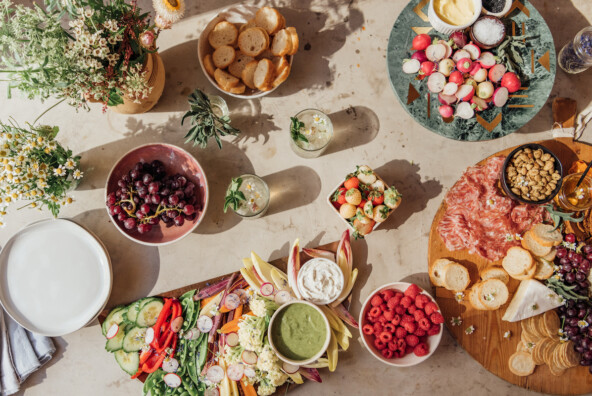We all know the feeling: Mid-afternoon hits, and your focus evaporates. You’re simultaneously rereading the same email, thinking about dinner, and deciding between coffee number two or a handful of your kids’ chocolate chip cookies. And most days, the quickest option wins. The good news? Sustained energy isn’t about willpower or cutting everything “bad” out. It’s about understanding what drains your energy—and choosing foods that work with your biology. Here’s how to eat for energy that lasts.


Why Sugar and Carbs Sound Appealing When You’re Tired
When energy levels dip, the body naturally seeks the fastest available fuel. That’s why refined carbs and caffeinated drinks feel so appealing when you’re tired. They raise blood sugar quickly, delivering a brief sense of alertness and pleasure—hello, dopamine! However, that spike is almost always followed by a crash (as someone who has worn a continuous glucose monitor, I am well aware of this). In turn, energy feels unpredictable. You’re wired or wiped, not calm and steady. This is precisely where food becomes one of the most powerful tools for energy regulation.
What (Food) Drains Your Energy
So, what are the biggest offenders? Highly processed carbs; think white bread, pastries, sweetened yogurts, cereal, candy, and even many “snack foods.” These are all digested rapidly because their fiber has been stripped away. Inevitably, blood sugar rises fast. The result? Fatigue, brain fog, and more cravings. The same pattern can happen with caffeine, especially when it’s consumed without food. You may feel wired at first, only to feel jittery, anxious, or exhausted later. This doesn’t mean coffee is off the table! It just means context matters.
Why Steady Glucose Is Key
We’ve said it once, but we’ll say it again: At the root of stable energy is blood sugar balance. When glucose levels stay relatively even, energy, mood, and focus tend to follow. Balanced meals—those that combine protein, fiber-rich carbohydrates, and healthy fats—digest more slowly and provide a steady release of fuel. Eaten every 3-4 hours, this approach helps prevent dramatic dips in blood sugar. Instead of chasing energy, you build it.
Anchor Your Meals With Protein
Speaking of protein, this macronutrient plays a particularly important role here. Research consistently shows that meals higher in protein support better glucose control, improved satiety, and more sustained energy (compared to meals dominated by refined carbs). Think of protein as a time-release capsule; it keeps you fueled long after the meal is over. It also supports the hormones that signal fullness and satiety, helping reduce the urge to reach for quick energy later on. In practical terms? This often means fewer cravings and a calmer, more focused afternoon.
Energy Comes From Patterns, Not Superfoods
As a whole, foods that boost energy tend to share a few things in common: they’re minimally processed, nutrient-dense, and supportive of metabolic health. Ultimately, rather than focusing on one “superfood” for endurance, think of energy as a result of patterns (balanced meals, eaten consistently throughout the day). Over time, this approach creates steady stamina. That way, you’re not constantly chasing a quick boost.
Foods That Fuel Energy
Some house favorites include:
- Eggs and Greek yogurt. Rich in B vitamins that help convert food into usable energy.
- Fatty fish like salmon. Provides omega-3s to reduce inflammation and support brain function.
- Leafy greens. High in iron and magnesium (both essential for energy production).
- Whole grains like oats. Contain soluble fiber that slows glucose absorption.
- Nuts, seeds, and avocado. Provide healthy fats that stabilize blood sugar and promote satiety.
- Berries and sweet potatoes. Offer natural carbs paired with fiber and antioxidants.
Simple Daily Meal Ideas
Of course, knowing what to eat is helpful. But knowing how to apply it is where energy really shifts.
Breakfast
Start your day with a protein-forward breakfast. This could look like eggs with greens and avocado, Greek yogurt with berries and ground flax, or a smoothie that includes protein, fiber, and fat—not just fruit. Beginning the day this way helps regulate blood sugar for hours and often reduces afternoon crashes altogether.
Lunch
At lunch, think balanced—not light. A combination of protein, vegetables, slow-digesting carbs, and healthy fats will keep you focused through the second half of the day. Grain bowls, hearty salads with protein, or leftovers from dinner all work beautifully.
Snacks
For healthy snacks, prioritize satisfaction over restriction. Apple slices with nut butter, yogurt with seeds, a handful of pistachios with dried apricots, or dark chocolate paired with almonds provide both energy and staying power.
Dinner
Dinner is your chance to round out the day with a satisfying, nutrient-dense meal that supports recovery and sets you up for tomorrow. Again, aim for a mix of protein, fiber-rich vegetables, and complex carbs—think roasted salmon with sweet potato and sautéed greens, or a chicken and vegetable stir-fry over quinoa.
And when it comes to caffeine, pay attention to how it feels with food versus on its own. Many people find that pairing coffee or tea with a balanced meal leads to calmer, longer-lasting energy and better focus.


Energy Is Built, Not Hacked
To bring this full circle, sustained energy isn’t about eliminating entire food groups or relying on constant stimulation to push through the day. It’s about working with your body’s natural rhythms and giving it the fuel it needs. When in doubt, build your meals around protein and fiber! You’ll keep blood sugar steady and—best of all—energy becomes more predictable. From one woman (and mom) to another, I want you to move through your day with greater stability. Cheers to lasting energy—for you and everyone who depends on you, too.

This post was last updated on January 19, 2026, to include new insights.






